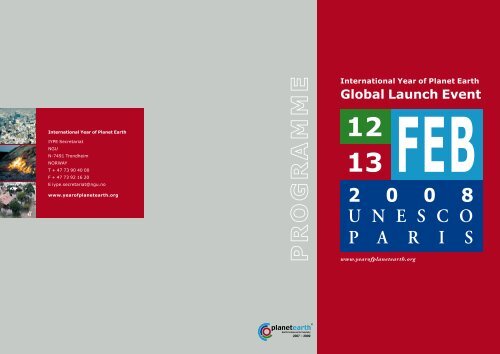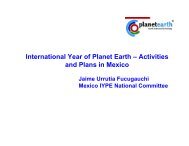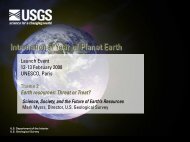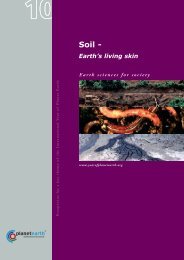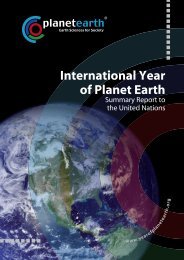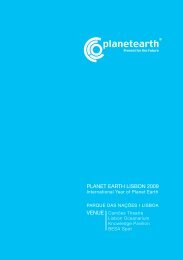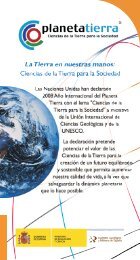2 0 0 8 U N E S C O P A R I S - International Year of Planet Earth
2 0 0 8 U N E S C O P A R I S - International Year of Planet Earth
2 0 0 8 U N E S C O P A R I S - International Year of Planet Earth
Create successful ePaper yourself
Turn your PDF publications into a flip-book with our unique Google optimized e-Paper software.
<strong>International</strong> <strong>Year</strong> <strong>of</strong> <strong>Planet</strong> <strong>Earth</strong><br />
Global Launch Event<br />
<strong>International</strong> <strong>Year</strong> <strong>of</strong> <strong>Planet</strong> <strong>Earth</strong><br />
IYPE Secretariat<br />
NGU<br />
N-7491 Trondheim<br />
NORWAY<br />
T + 47 73 90 40 00<br />
F + 47 73 92 16 20<br />
E iype.secretariat@ngu.no<br />
www.year<strong>of</strong>planetearth.org<br />
12<br />
13<br />
2 0 0 8<br />
U N E S C O<br />
P A R I S<br />
www.year<strong>of</strong>planetearth.org<br />
planetearth<br />
<strong>Earth</strong> Sciences for Society<br />
2007 - 2009
Message from Mr Koïchiro Matsuura, Director-General<br />
<strong>of</strong> UNESCO on the occasion <strong>of</strong> the Global Launch Event<br />
<strong>of</strong> the <strong>International</strong> <strong>Year</strong> <strong>of</strong> <strong>Planet</strong> <strong>Earth</strong><br />
UNESCO, 12 and 13 February 2008<br />
<strong>International</strong> <strong>Year</strong> <strong>of</strong> <strong>Planet</strong> <strong>Earth</strong> will focus on the fundamental<br />
role <strong>of</strong> the <strong>Earth</strong> sciences in maintaining a healthy <strong>Earth</strong> system,<br />
thus enabling our modern society to plan for sustainable<br />
development within the context <strong>of</strong> global climate change.<br />
This is a timely and pertinent initiative. Never before in<br />
history has the <strong>Earth</strong> been subject to such rapid and pr<strong>of</strong>ound<br />
changes, both in terms <strong>of</strong> the physical environment and <strong>of</strong><br />
social transformations.<br />
The <strong>Year</strong> has set itself the ambitious target to foster closer<br />
collaboration between the international community <strong>of</strong> <strong>Earth</strong><br />
scientists and policy-makers, government planners and the<br />
private sector worldwide. Indeed, we must ensure that the<br />
knowledge we possess about our planet is efficiently used in a<br />
coherent way to make the <strong>Earth</strong> a safer and more prosperous<br />
place for all.<br />
In addition, young people have been invited to our debates in<br />
order to raise their interest in science, as well as contribute<br />
their perspective to <strong>Earth</strong>-related issues that will greatly affect<br />
them in the coming years. We must encourage youth to choose<br />
careers in science and technology. Indeed, many more young<br />
minds are needed for the development <strong>of</strong> a knowledge-based<br />
society.<br />
I trust that today’s IYPE celebration is only the starting point<br />
for many geoscience outreach activities, in all regions <strong>of</strong> the<br />
world and throughout the <strong>Year</strong>, and that these activities will<br />
lead to a long overdue recognition <strong>of</strong> the important contribution<br />
<strong>of</strong> the <strong>Earth</strong> sciences to society.<br />
Koïchiro Matsuura<br />
Numerous scientific and outreach activities have been planned<br />
for the <strong>Year</strong>. More than 60 national committees have so far been<br />
created to coordinate activities for the <strong>Year</strong> on the country level.<br />
These activities fall under one <strong>of</strong> ten broad themes, chosen for<br />
their relevance to society and outreach potential. These are:<br />
Groundwater; Hazards; <strong>Earth</strong> and Health; Climate; Resources;<br />
Megacities; Deep <strong>Earth</strong>; Ocean; Soil; and <strong>Earth</strong> and Life.<br />
For today’s global launch event, leading politicians, heads <strong>of</strong><br />
geoscientific organizations and renowned individuals from the<br />
business sector have been invited to share their views on societal<br />
problems relating to the <strong>Earth</strong> and to put forward solutions or<br />
ideas for mitigation.
2007 - 2009<br />
IYPE Student Contest<br />
planetearth<br />
<strong>Earth</strong> Sciences for Society<br />
2008 Inter national <strong>Year</strong> <strong>of</strong> <strong>Planet</strong> Ear th<br />
IYPE<br />
Student<br />
Contest<br />
<strong>International</strong> Student Contest<br />
It is considered that the creativity and perception <strong>of</strong> students<br />
will contribute to new perspectives on the major themes <strong>of</strong> the<br />
<strong>International</strong> <strong>Year</strong> <strong>of</strong> <strong>Planet</strong> <strong>Earth</strong>. Therefore, the IYPE Organization<br />
decided to set up an <strong>International</strong> Student Contest. Winners <strong>of</strong> this<br />
contest are invited to participate in the Global Launch Event <strong>of</strong> the<br />
<strong>International</strong> <strong>Year</strong> <strong>of</strong> <strong>Planet</strong> <strong>Earth</strong>.<br />
Students from all over the world responded to this initiative<br />
and created essays, poems, drawings, video messages and other<br />
contributions on the IYPE themes. They approached their<br />
preferred topic(s) from their own, personal perspective, driven<br />
by their individual cultural background and education. The best<br />
approximately 130 works were selected by the National Committees<br />
and the IYPE Outreach Programme Committee.<br />
Moderator Day 1<br />
Pr<strong>of</strong> Aubrey Manning<br />
Independent Correspondent<br />
Pr<strong>of</strong>essor Aubrey Manning is a renowned zoologist, writer, broadcaster<br />
and one <strong>of</strong> the Goodwill Ambassadors for the <strong>International</strong><br />
<strong>Year</strong> <strong>of</strong> <strong>Planet</strong> <strong>Earth</strong>. His television and radio work has inspired<br />
new interest in <strong>Earth</strong> sciences and the way in which they integrate<br />
with life sciences ( BBC Two’s ‘<strong>Earth</strong> Story’ and BBC Radio Four’s<br />
‘The Rules <strong>of</strong> Life’). He read Zoology at University College<br />
London before completing a doctorate in animal behaviour at the<br />
University <strong>of</strong> Oxford. He joined the University <strong>of</strong> Edinburgh as an<br />
Assistant Lecturer in Zoology, rising to Pr<strong>of</strong>essor <strong>of</strong> Natural<br />
History. He is currently Emeritus pr<strong>of</strong>essor.<br />
During the Global Launch<br />
Event <strong>of</strong> the <strong>International</strong><br />
<strong>Year</strong> <strong>of</strong> <strong>Planet</strong> <strong>Earth</strong> (12 and<br />
13 February 2008) world<br />
leaders in politics, science and<br />
industry will share their views<br />
with an audience <strong>of</strong> 1000<br />
invited guests, including some<br />
350 award-winning students<br />
from all around the world.<br />
The creativity and perception<br />
<strong>of</strong> these students will<br />
contribute to new perspectives<br />
on the major themes <strong>of</strong> the<br />
<strong>International</strong> <strong>Year</strong> <strong>of</strong> <strong>Planet</strong><br />
<strong>Earth</strong>.<br />
As part <strong>of</strong> this celebration,<br />
the <strong>International</strong> <strong>Year</strong> <strong>of</strong><br />
<strong>Planet</strong> <strong>Earth</strong> Corporation<br />
is organizing an <strong>International</strong><br />
Student Contest. All 18-22 year<br />
old students from around the<br />
world are invited to participate<br />
by submitting a creative<br />
document on one <strong>of</strong> the<br />
10 IYPE themes (groundwater,<br />
hazards, climate change,<br />
health, resources, megacities,<br />
soil, deep earth, ocean and<br />
<strong>Earth</strong> & life).<br />
Pending available funds,<br />
award-winning students will<br />
be invited to visit Paris for four<br />
days (11-14 February 2008)<br />
entirely free <strong>of</strong> charge, and<br />
to participate in the Global<br />
Launch Event. Three out <strong>of</strong><br />
all award-winning students<br />
will be selected and invited<br />
to perform or display and<br />
comment upon their work on<br />
stage.<br />
Deadlines<br />
Contributions must be<br />
submitted to National IYPE<br />
Committees or to the IYPE<br />
Secretariat no later than<br />
November 15 th 2007.<br />
Sponsoring<br />
As the number <strong>of</strong> invited<br />
award-winning students<br />
almost entirely depends<br />
on available funding<br />
from national resources,<br />
National IYPE Committees<br />
are strongly advised to<br />
secure such national funds.<br />
National IYPE Committees in<br />
developing countries might<br />
apply for additional funds<br />
made available by some<br />
international organisations<br />
and Ministries <strong>of</strong> Foreign<br />
Affairs. Industries and nations<br />
are kindly invited to consider<br />
sponsoring this Global Launch<br />
Event.<br />
Information<br />
For all information, please<br />
check the IYPE website<br />
www.year<strong>of</strong>planetearth.org or<br />
contact the IYPE Secretariat:<br />
iype.secretariat@ngu.no<br />
Three out <strong>of</strong> all award-winning students have been selected to<br />
perform or display and comment upon their work on stage during<br />
the Global Launch Event as an introduction to each <strong>of</strong> the three<br />
debates.<br />
Apart from participating in the Global Launch Event, students are<br />
invited to join an <strong>of</strong>ficial visit to the Museum <strong>of</strong> Natural History.<br />
Geo Song<br />
Not only will the students be part <strong>of</strong> the discussions, they will also<br />
participate in the Geo Song “Mother <strong>Earth</strong>” during the first day <strong>of</strong><br />
the Global Launch Event. The song has been especially composed for<br />
this occasion and, in order to generate a sense <strong>of</strong> community and to<br />
ensure maximum involvement on the part <strong>of</strong> the audience, all award<br />
winning students from every continent will perform in this choral<br />
presentation. They will be accompanied by three musicians. The stage<br />
setting and coaching <strong>of</strong> the students will be carried out by M-A.S<br />
Productions.<br />
Moderator Day 2<br />
Marina Mielczarek<br />
Independent Correspondent<br />
Marina Mielczarek is currently Grand Reporter at Radio France<br />
<strong>International</strong>e. As a field journalist for more then 12 years, she has<br />
travelled through many continents, especially in developing<br />
countries in Africa and Asia reporting on current scientific and<br />
societal issues. She carries out investigations on international<br />
politics focussing on the challenges <strong>of</strong> the 21 century such as<br />
the population balances, access to education, water, demographic<br />
ageing, architecture, prostitution, aids, drugs and prisons. She teaches<br />
at l’Institut Pratique du Journalisme IPJ for 5 years.
Session 1<br />
Population growth and climate change: challenges for planet <strong>Earth</strong><br />
Introduction<br />
By 2050, almost 3 billion more people will live on this planet, mostly in cities. Together, they will<br />
need more resources (water, energy material, minerals, metals, soils for food) and their joint<br />
impact on planet <strong>Earth</strong> will probably be much heavier than today. Humankind not only impacts<br />
the planet’s climatic conditions but has become a geological agent by moving more <strong>Earth</strong> materials<br />
than all natural geological processes together. This unprecedented and dynamic force does not<br />
threaten <strong>Earth</strong> itself but it is having increasing impacts on our planet’s life support systems.<br />
The challenge is for us to bring ourselves and our demands more into balance with all other natural<br />
forces. Only then shall we secure a long-term future for humanity and much <strong>of</strong> the rest <strong>of</strong> life.<br />
Issues<br />
What will planet <strong>Earth</strong> look like in 2050? Is the impact <strong>of</strong> climate change on humankind only<br />
ever negative? Are there limits to sustainable urban growth? How are these concerns addressed in<br />
national and international policy making? How can science and technology contribute to solving<br />
problems related to climate change for growing populations?
Dr Renate Christ<br />
Secretary <strong>of</strong> the Intergovernmental Panel on Climate Change (IPCC)<br />
Dr Renate Christ is Secretary <strong>of</strong> the Intergovernmental Panel on<br />
Climate Change (IPCC) that, together with Albert Arnold (Al)<br />
Gore Jr., received the Nobel Peace Prize 2007 “for their efforts to<br />
build up and disseminate greater knowledge about man-made<br />
climate change, and to lay the foundations for the measures that are<br />
needed to counteract such change”. Renate Christ has worked at the<br />
European Commission DG XI, the UN Environment Programme<br />
and the Austrian Ministry <strong>of</strong> the Environment being responsible for<br />
climate change and other issues. She was a lecturer and carried out<br />
research at several universities and institutes. She holds a Ph.D in<br />
eco-physiology from the University <strong>of</strong> Salzburg.<br />
Pr<strong>of</strong> Ruud Lubbers<br />
Former Prime Minister <strong>of</strong> the Netherlands<br />
As a citizen <strong>of</strong> Rotterdam, Ruud Lubbers became involved in the<br />
environmental problems in that city and port already at the end<br />
<strong>of</strong> the sixties <strong>of</strong> last century. That went on as a Minister for<br />
Economic Affairs and Energy from 1973 - 1979, and as a Prime<br />
Minister from 1982 - 1994. Those decades he worked very much<br />
in tandem with Gro Harlem Brundtland. Together with Maurice<br />
Strong, Michael Gorbachev and Steven Rockefeller he was instrumental<br />
in the <strong>Earth</strong> Charter. He is a patron <strong>of</strong> IYPE and still<br />
active in the <strong>Earth</strong> Charter Initiative, but is also key to the<br />
Rotterdam Climate Initiative and the World Ports Conference<br />
on Climate July 2008.<br />
Pr<strong>of</strong> Ghislain de Marsily<br />
French Academy <strong>of</strong> Sciences<br />
Ghislain de Marsily is Emeritus Pr<strong>of</strong>essor <strong>of</strong> Applied Geology at the<br />
University Pierre et Marie Curie – Paris VI and at the Paris École<br />
des Mines. His research interests include aquifer management and<br />
protection; waste disposal (including nuclear waste); global watershed<br />
functioning (surface water quality, human impact assessment<br />
and ecosystem protection); global water resources and sustainable<br />
development. He is a member <strong>of</strong> the French Academy <strong>of</strong> Sciences<br />
where he coordinated the preparation <strong>of</strong> Science and Technology<br />
Report “Continental Waters” <strong>of</strong> the Academy, published in 2006.<br />
Ms Arti Mehra<br />
Mayor Delhi, India<br />
Ms Arti Mehra, educated at Delhi University, is the Mayor <strong>of</strong><br />
Delhi, an <strong>of</strong>fice to which she was unanimously elected at her<br />
first attempt. Her youthful energy and reputation as a dynamic<br />
personality is in tune with the considerable demands <strong>of</strong> Indian<br />
social and political leadership. She has been elected for the third<br />
time as a Member <strong>of</strong> the Municipal Corporation <strong>of</strong> Delhi and<br />
has shown herself to be a dedicated and considerate member <strong>of</strong><br />
that Corporation for the past ten years.
IYPE Launch Event Tentative Programme<br />
Day 1 12 February 2008<br />
08.30 Registration <strong>of</strong> guests at UNESCO Headquarters<br />
10.00 Opening by Master <strong>of</strong> Ceremony Dr Ted Nield<br />
Chair <strong>of</strong> IYPE Outreach Programme Committee<br />
Address by UNESCO Director-General<br />
Koïchiro Matsuura<br />
Address by Pr<strong>of</strong> Zhang Hongren<br />
President <strong>of</strong> the <strong>International</strong> Union <strong>of</strong> Geological<br />
Sciences (IUGS)<br />
Address by Pr<strong>of</strong> Larry Woodfork<br />
Chair <strong>of</strong> the IYPE Board <strong>of</strong> Directors<br />
Introduction by Nicolas Sarkozy<br />
President <strong>of</strong> the French Republic<br />
Statements by Heads <strong>of</strong> State/Ministers and UN Heads<br />
Presentation <strong>of</strong> Paris Declaration<br />
Introduction to the sessions by Pr<strong>of</strong> Aubrey Manning<br />
Independent correspondent<br />
13.00 Lunch and Press<br />
15.00 Cultural Event<br />
15.20 Theme 1: Population growth and climate change:<br />
challenges for planet <strong>Earth</strong><br />
Introduction by moderator Pr<strong>of</strong> Aubrey Manning<br />
Student winner <strong>of</strong> IYPE contest reads his/her winning<br />
essay<br />
Views on theme by Dr Renate Christ<br />
Secretary <strong>of</strong> Intergovernmental Panel on Climate<br />
Change (IPCC)<br />
Views on theme by Pr<strong>of</strong> Ghislain de Marsily<br />
French Academy <strong>of</strong> Sciences<br />
16.20 C<strong>of</strong>fee / Tea breaks<br />
16.40 Views on theme by Pr<strong>of</strong> Ruud Lubbers<br />
Former Prime Minister <strong>of</strong> the Netherlands<br />
Views on theme by Ms Arti Mehra<br />
Mayor <strong>of</strong> Delhi, India<br />
Discussion with audience chaired by<br />
moderator Pr<strong>of</strong> Aubrey Manning<br />
Concluding remarks by moderator<br />
Pr<strong>of</strong> Aubrey Manning<br />
19.00 - 21.00 Evening Reception
IYPE Launch Event Tentative Programme<br />
Day 2 13 February 2008<br />
09.00 Arrival <strong>of</strong> guests at UNESCO Headquarters<br />
09.30 Opening by Master <strong>of</strong> Ceremony Dr Ted Nield<br />
Chair <strong>of</strong> IYPE Outreach Programme Committee<br />
Introduction by Pr<strong>of</strong> Mohammed Sheya<br />
Minister Plenipotentiary, United Republic <strong>of</strong> Tanzania<br />
09.45 Theme 2: <strong>Earth</strong> resources: threat or treat?<br />
Introduction by moderator Marina Mielczarek<br />
Independent correspondent<br />
Student winner <strong>of</strong> IYPE contest reads his/her winning essay<br />
Views on theme by Thierry Desmarest<br />
Chair <strong>of</strong> the Board <strong>of</strong> Directors <strong>of</strong> Total<br />
Views on theme by Dr Mark Myers<br />
Director <strong>of</strong> United States Geological Survey<br />
Views on theme by Vice Minister Wang Shouxiang<br />
Ministry <strong>of</strong> Land and Resources <strong>of</strong> the People’s Republic<br />
<strong>of</strong> China<br />
11.40 Theme 3: Geohazards: minimizing risk,<br />
maximizing awareness<br />
Introduction by moderator Marina Mielczarek<br />
Student winner <strong>of</strong> IYPE contest reads his/her<br />
winning essay<br />
Views on theme by Pr<strong>of</strong> Peter Hoeppe<br />
Münich Reinsurance, Germany<br />
Views on theme by Pr<strong>of</strong> Sospeter Muhongo<br />
Director Regional Office for Africa <strong>of</strong> the <strong>International</strong><br />
Council for Sciences (ICSU), South Africa<br />
Discussion with audience chaired by moderator<br />
Marina Mielczarek<br />
Concluding remarks by moderator Marina Mielczarek<br />
13.15 Closing remarks by UNESCO Director-General<br />
Koïchiro Matsuura<br />
13.25 Video message by Sir Arthur C. Clarke<br />
Sir Arthur C. Clarke Foundation<br />
Discussion with audience chaired by moderator Marina<br />
Mielczarek<br />
Concluding remarks by moderator Marina Mielczarek<br />
11.20 C<strong>of</strong>fee / Tea breaks
Session 2<br />
Theme 2: <strong>Earth</strong> resources: threat or treat?<br />
Introduction<br />
Today, commodity prices are sky high because <strong>of</strong> an unprecedented demand for <strong>Earth</strong> resources.<br />
Extraction <strong>of</strong> natural resources and the economies <strong>of</strong> related industries are booming, but benefits<br />
are <strong>of</strong>ten spread unevenly among nations and people. Natural resource-rich countries do not<br />
necessarily invest their advantage in building more competitive and lasting economies. Extraction<br />
and processing <strong>of</strong> <strong>Earth</strong> materials is <strong>of</strong>ten associated with landscape destruction and environmental<br />
pollution. Sound stewardship also requires setting aside sufficient resources for generations to<br />
come. Humankind has always adapted to conditions <strong>of</strong> scarcity but the challenge we face today is<br />
to build economies that take into account the depletion <strong>of</strong> resources.<br />
Issues<br />
Are natural resources really becoming depleted? What is Science and technology contributing to<br />
address this problem? Can extraction and processing <strong>of</strong> natural resources be made sustainable and<br />
at affordable cost? How do industries contribute to the establishment <strong>of</strong> sustained socio-economic<br />
development? How does good governance contribute to optimizing a country’s benefit from its<br />
natural resources? Do nations safeguard resources for future generations? Can scientists, industry<br />
and politicians produce more accessible information on resources and reserves so as to improve<br />
international relations?
Thierry Desmarest<br />
Chair <strong>of</strong> the Board <strong>of</strong> Directors <strong>of</strong> Total<br />
Thierry Desmarest is the current Chair <strong>of</strong> the Board<br />
<strong>of</strong> Directors <strong>of</strong> Total. He began his career in 1971 as head<br />
<strong>of</strong> the Mining Directorate in New Caledonia, before<br />
serving as a technical advisor at the Ministry <strong>of</strong> Industry<br />
(1975-1978) then at the Ministry <strong>of</strong> Economic Affairs<br />
(1978-1980). He joined Total in 1981 and was Chief<br />
Executieve Officer from 1995 to 2007. He is a graduate<br />
<strong>of</strong> the École Polytechnique and <strong>of</strong> the École des Mines.<br />
Wang Shouxiang<br />
Vice Minister <strong>of</strong> the Ministry <strong>of</strong> Land and Resources<br />
Wang Shouxiang was born in 1951 in China’s Liaoning<br />
Province. He graduated from Beijing University <strong>of</strong> Posts and<br />
Telecommunications with a bachelor degree in engineering.<br />
He worked successively as Division Director <strong>of</strong> the General<br />
Office <strong>of</strong> the State Council’s Census Task Force, Division<br />
Director <strong>of</strong> the National Bureau <strong>of</strong> Statistics, Director<br />
General <strong>of</strong> the Department <strong>of</strong> Personnel <strong>of</strong> the Ministry <strong>of</strong><br />
Supervision. He is now the Vice Minister <strong>of</strong> the Ministry<br />
<strong>of</strong> Land and Resources <strong>of</strong> the People’s Republic <strong>of</strong> China.<br />
Dr Mark D. Myers<br />
Director, U.S. Geological Survey<br />
On September 26, 2006, Dr Mark D. Myers became the<br />
14th Director <strong>of</strong> the U.S. Geological Survey, U.S. Department<br />
<strong>of</strong> the Interior. He is an internationally recognized geologist and<br />
former State Geologist and head <strong>of</strong> Alaska’s Geological Survey.<br />
Mark Myers is an expert on North Slope (Alaska) sedimentary<br />
and petroleum geology and served as survey chief for field<br />
programs several arctic areas. He received his doctorate in<br />
geology from the University <strong>of</strong> Alaska-Fairbanks in 1994,<br />
specializing in sedimentology. He earned his B.S. and M.S.<br />
degrees in geology from the University <strong>of</strong> Wisconsin-Madison.<br />
Pr<strong>of</strong> Peter Hoeppe<br />
Münich Reinsurance<br />
Pr<strong>of</strong> Hoeppe joined the Münich Reinsurance Company<br />
in 2004. He was appointed Head <strong>of</strong> the Geo Risks Research<br />
Department in January 2005. Pr<strong>of</strong> Hoeppe is scientific<br />
member <strong>of</strong> many scientific societies. From 1999 to 2002<br />
he has been the President <strong>of</strong> the <strong>International</strong> Society<br />
<strong>of</strong> Biometeorology. He has held various expert functions<br />
in WHO and WMO. April 2007, Pr<strong>of</strong> Hoeppe has been<br />
appointed member <strong>of</strong> the Global Warming Advisory Board<br />
<strong>of</strong> the Bavarian State Government.
Session 3<br />
Geohazards: minimizing risk,<br />
maximizing awareness<br />
Introduction<br />
<strong>Planet</strong> <strong>Earth</strong> is not always in a state <strong>of</strong> balance, equilibrium<br />
and natural harmony. Indeed, dynamic processes in the interior<br />
<strong>of</strong> the <strong>Earth</strong> are <strong>of</strong>ten expressed at the surface which,<br />
in turn, sometimes enhances the impact <strong>of</strong> natural hazards<br />
that disrupt public life. Human occupation <strong>of</strong> the planet is<br />
subject to the inevitability <strong>of</strong> changing conditions in the<br />
<strong>Earth</strong> crust. Humankind may trigger, accelerate or even<br />
reduce the myriad <strong>of</strong> natural disasters and their consequent<br />
impact on communities. The physical occurrence and economic<br />
effects <strong>of</strong> natural calamities are not evenly distributed<br />
around the globe. Frequently, it is the less developed nations<br />
that suffer most <strong>of</strong> the human losses, while the more developed<br />
nations are ultimately exposed to the economic costs.<br />
Unfortunately, and for a wide variety <strong>of</strong> reasons, people<br />
will continue to live under conditions <strong>of</strong> increasing risk.<br />
Pr<strong>of</strong> Sospeter Muhongo<br />
Director Regional Office for Africa <strong>of</strong> the <strong>International</strong> Council for Sciences (ICSU)<br />
Pr<strong>of</strong> Sospeter Muhongo, a Tanzanian, is the Director Regional Office for<br />
Africa <strong>of</strong> the ICSU. He is the Chair <strong>of</strong> the Science Programme Committee<br />
(SPC) <strong>of</strong> the <strong>International</strong> <strong>Year</strong> <strong>of</strong> <strong>Planet</strong> <strong>Earth</strong> (IYPE). He is a pr<strong>of</strong>essor<br />
<strong>of</strong> geology at the Universities <strong>of</strong> Dar Es Salaam and Pretoria, and a fellow<br />
<strong>of</strong> seven highly learned pr<strong>of</strong>essional societies. He has occupied numerous<br />
important national, regional and international pr<strong>of</strong>essional positions<br />
dealing with science, technology and innovation. Pr<strong>of</strong> Muhongo, recipient<br />
<strong>of</strong> numerous scholarly and pr<strong>of</strong>essional awards, grants and fellowships<br />
studied geology at the Universities <strong>of</strong> Dar Es Salaam, Göttingen and<br />
TU-Berlin (Germany).<br />
Issues<br />
What are the real costs to human society <strong>of</strong> natural hazards?<br />
Will future generations suffer more or less from such<br />
hazards? How much do people contribute, directly or<br />
indirectly, to hazard-associated disasters? To what extent can<br />
natural hazards be predicted and their impacts mitigated by<br />
science and technology, now and in the foreseeable future?<br />
How can societies be made less vulnerable to the deleterious<br />
effects <strong>of</strong> natural hazards? What are the available sciencebased<br />
incentives that could be used to induce governments<br />
to minimize natural hazard risk? How can the (insurance)<br />
industry contribute?
Sponsors IYPE Global Launch Event<br />
UNESCO<br />
<strong>International</strong> Union <strong>of</strong> Geological Sciences (IUGS)<br />
Total<br />
Agence Nationale de Recherche (ANR)<br />
CGG Veritas<br />
EuroGeoSurveys (EGS)<br />
Mairie de Paris<br />
Ministère des Affaires Étrangères et Européennes (MAEE)<br />
Ministère de l’Enseignement Supérieur et de la Recherche (MESR)<br />
Muséum National d’Histoire Naturelle (MNHN)<br />
Ruimte voor Geo-Informatie (RGI)<br />
Yemen Airways
Sponsors IYPE Global Lunch Event<br />
Total<br />
Agence Nationale de Recherche (ANR)<br />
Ministère des Affaires Étrangères et Européennes (MAEE)<br />
Ministère de l’Enseignement Supérieur et de la Recherche (MESR)<br />
Mairie de Paris<br />
EuroGeoSurveys (EGS)<br />
Ministry <strong>of</strong> Environment Poland<br />
UNESCO<br />
Ruimte voor Geo-Informatie (RGI)<br />
Muséum National d’Histoire Naturelle (MNHN)<br />
<strong>International</strong> Union <strong>of</strong> Geological Sciences (IUGS)<br />
Yemen Airways<br />
OMV<br />
Ministry <strong>of</strong> Education and Research <strong>of</strong> Norway<br />
CGG Veritas<br />
Partners and sponsors IYPE<br />
Founding Partners<br />
- <strong>International</strong> Union <strong>of</strong> Geodesy and Geophysics (IUGG)<br />
- <strong>International</strong> Geographical Union (IGU)<br />
- <strong>International</strong> Union <strong>of</strong> Soil Sciences (IUSS)<br />
- <strong>International</strong> Lithosphere Programme (ILP)<br />
- TNO Built Environment and Geosciences - Geological Survey <strong>of</strong> the Netherlands (TNO)<br />
- World Soil Information (ISRIC)<br />
- Federation <strong>of</strong> <strong>International</strong> Geo-Engineering Societies (FIGS)<br />
- <strong>International</strong> Union for Quaternary Research (INQUA)<br />
- American Geological Institute (AGI)<br />
- American Association <strong>of</strong> Petroleum Geologists (AAPG)<br />
- American Institute <strong>of</strong> Pr<strong>of</strong>essional Geologists (AIPG)<br />
- Geological Society <strong>of</strong> London (GSL)<br />
<strong>International</strong> Partners<br />
- American Geophysical Union (AGU)<br />
- Geological Survey <strong>of</strong> Italy (APAT)<br />
- British Geological Survey (BGS)<br />
- EuroGeoSurveys (EGS)<br />
- European Geoscience Union (EGU)<br />
- Geological Society <strong>of</strong> America (GSA)<br />
- Geological Survey <strong>of</strong> Ireland (GSI)<br />
- Geological Survey <strong>of</strong> Japan (AIST)<br />
- Geological Survey <strong>of</strong> Spain (IGME)<br />
- National Aeronautics and Space Administration (NASA)<br />
- Norwegian Geological Survey (NGU)<br />
- Society <strong>of</strong> Exploration Geophysicists (SEG)<br />
- Springer Verlag<br />
- European Geopark Network (EGN)<br />
Sponsors<br />
- CGG Veritas<br />
- Ministry <strong>of</strong> Education Norway<br />
- Ministry <strong>of</strong> the Environment Poland<br />
- OMV


